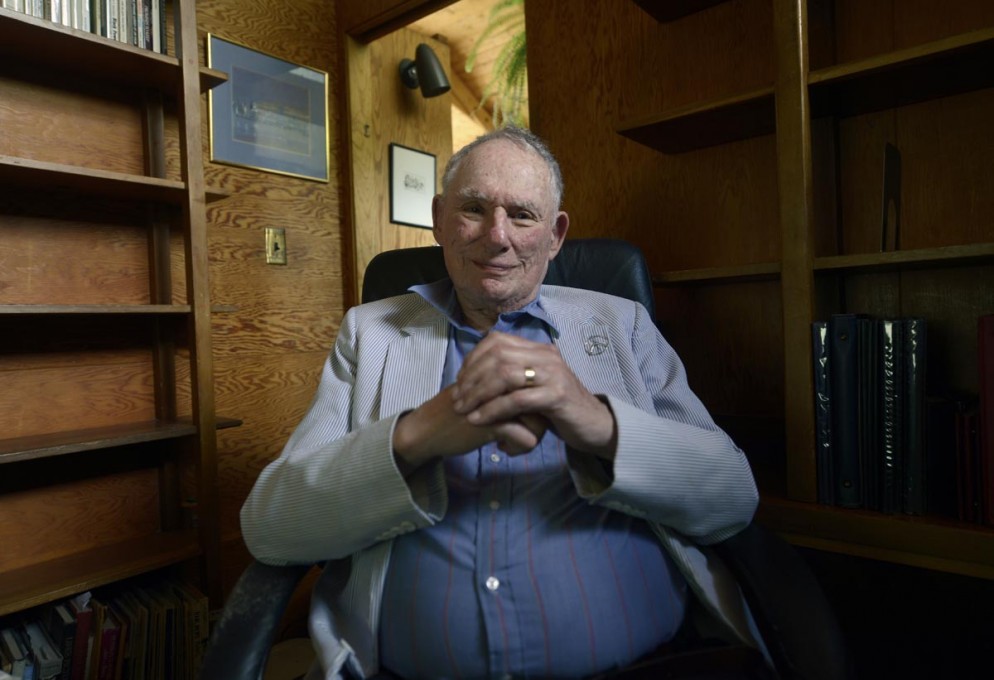This request to talk about what’s on my bookshelf comes at a bad time for me. I am in the process of giving away my books, hundreds on hundreds of books. They have surrounded me. I have lived with them, at home and in my former office at the college. They are my habitat. But I know that at my stage of retired life, I need to do this. My wife says the books have to go or I have to go.
Sorting my books is an anguishing task fraught with vivid memories. There is, for example, the textbook we used in Western civilization when it was a required course for first-year students. In those long-ago days, we used textbooks. That book starts in prehistory and finishes in the modern world. What a journey! I see those students sitting in front of me now, bright-faced and bumptious, wearing their beanies (caps they had to wear or risk having their heads shaved on the steps of Palmer Hall).
Then there are many books about Franklin Roosevelt and the New Deal I used in my hallmark course that students used to call “Bend the knee to Franklin D. in Recent U.S. History.” There are books about war experience, not military history, that resonate with my own experience in the Second World War, from Homer’s “Iliad” to Philip Caputo’s searing Vietnam memoir, “A Rumor of War.” Caputo came to my class once and talked about that book. (Homer didn’t.) There are collections of documents and their words of wisdom: Jefferson: “We hold these truths to be self-evident, that all men are created equal;” Lincoln: “Four score and seven years ago our fathers brought forth on this continent, a new nation, conceived in Liberty, and dedicated to the proposition that all men are created equal;” Wilson: “The 14 Points;” Franklin Roosevelt: “The only thing we have to fear is fear itself.”
And, above all, there are the books we used in Freedom and Authority, the pioneering general studies course I inherited from LEW Worner (as Lloyd E. Worner was known), when CC President William Gill precipitously installed him in the Dean’s Office in the middle of the spring semester, 1955. Those Freedom and Authority books blew my university-specialized mind. When I took over the course from LEW, he handed me an armful of books and said, “You know about Hume’s “Dialogues on Natural Religion” and Dostoyevsky’s “Grand Inquisitor,” the class is now discussing.” Then he disappeared in the Dean’s Office, too harried to speak further. Hell, I had never heard of those gems! When I walked into the library of Hayes House, where Packard Hall now stands, I went around the table and asked the students what the Freedom and Authority course was about. Van Skilling, later chairman of the college’s Board of Trustees, was in that class.
I prevailed upon Philosophy Professor Glenn Gray and English Professor George McCue, who were also teaching Freedom and Authority, to have lunch each week and help me understand the new books I was to teach — the Book of Job and Plato, Voltaire and John Stuart Mill, Kierkegaard and John Dewey… Talk about living by your wits! Those Freedom and Authority book lunches have gone on for more than 60 years now. The Freedom and Authority book that probably had the greatest impact on me was Albert Camus’ “The Plague,” in which two sensitive and humane men seek to find sense and meaning in a deadly, chaotic world. I had just finished my Ph.D. when I started teaching at Colorado College, but my real education began teaching books in Freedom and Authority and other courses here.
When I glance through my books now, with tears in my eyes, I realize readers have an almost insurmountable problem. There are always new items out there to read. But reading an old book again is an exciting new experience. It is an impossible challenge, reading the new and rereading the old. How can I get rid of my books? NO! I CAN’T DO IT! I WON’T DO IT!
I’m going to keep some of them at least. They have been the warp and woof of my life for the more than the half century I was privileged to teach books at this great college.
Professor Emeritus of History Bill Hochman began teaching at Colorado College in 1955 and retired in 1998. Hochman, who is among those featured in “Celebrating CC People,” (www.coloradocollege.edu/celebratingccpeople) is known for devotion to the liberal arts, the Freedom and Authority class, and his passion for peace.
